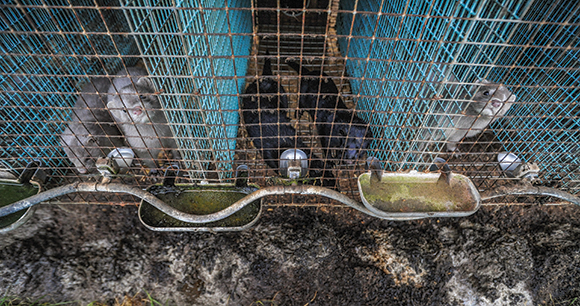This year, AWI is supporting federal, state, and local efforts to restrict fur farming and end the sale of new fur products. The extreme crowding and confinement on fur farms lead to serious physical and mental health problems for the animals, including infections, severe wounds, self-mutilation, cannibalism, and other stress-related stereotypical behaviors. Slaughter methods are similarly inhumane. When animals’ pelts are at their peak quality (within the first year of life), the animals are gassed, electrocuted, bludgeoned, or otherwise killed by breaking their necks.

Mink farms, in particular, are also a public health hazard. Mink and humans can become infected by some of the same serious respiratory viruses, such as those responsible for bird flu and COVID-19. Mink on such farms are potentially potent “mixing vessels” for generating novel strains of these viruses that could be transmitted to people.
In February in the Illinois House of Representatives, Rep. Joyce Mason (D-61) introduced the AWI-backed Mink Facility Disease Prevention Act (HB 2627) to require disease prevention and surveillance measures on farms that raise and slaughter mink for their fur. In March, AWI submitted testimony to the Chicago City Council in support of an ordinance to prohibit the sale of new fur products. Meanwhile in Congress, Rep. Adriano Espaillat (D-NY) reintroduced the Mink: Vectors for Infection Risk in the United States Act (Mink VIRUS Act, HR 2185), which would phase out US mink farms within one year and establish a grant program to reimburse farmers for the full value of their operations. This would help farmers transition away from an industry that has been in steep decline for many years, while also protecting public health and ending the cruel cycle of breeding and slaughtering mink for their fur.